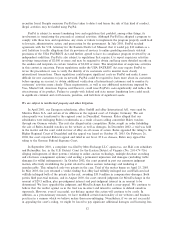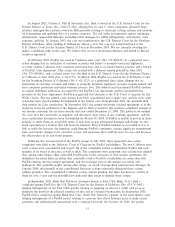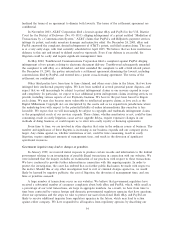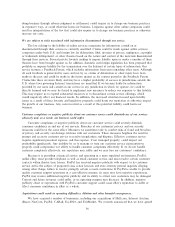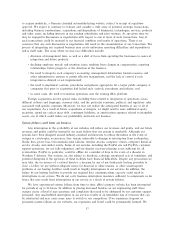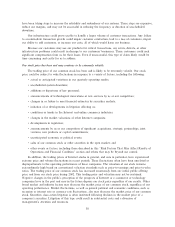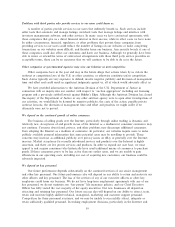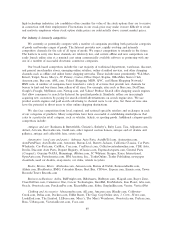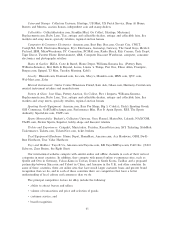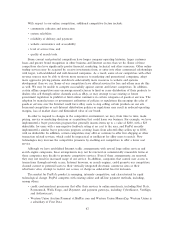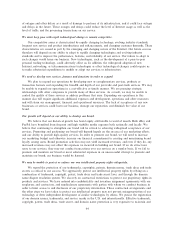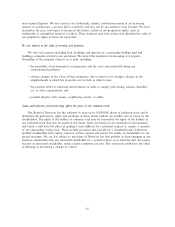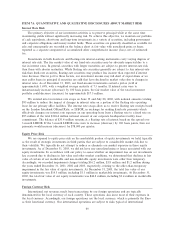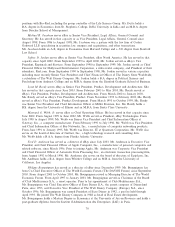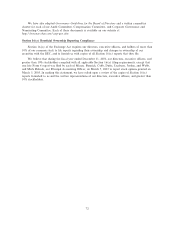eBay 2003 Annual Report Download - page 64
Download and view the complete annual report
Please find page 64 of the 2003 eBay annual report below. You can navigate through the pages in the report by either clicking on the pages listed below, or by using the keyword search tool below to find specific information within the annual report.With respect to our online competition, additional competitive factors include:
‚ community cohesion and interaction;
‚ system reliability;
‚ reliability of delivery and payment;
‚ website convenience and accessibility;
‚ level of service fees; and
‚ quality of search tools.
Some current and potential competitors have longer company operating histories, larger customer
bases and greater brand recognition in other business and Internet sectors than we do. Some of these
competitors also have signiÑcantly greater Ñnancial, marketing, technical and other resources. Other online
trading services may be acquired by, receive investments from, or enter into other commercial relationships
with larger, well-established and well-Ñnanced companies. As a result, some of our competitors with other
revenue sources may be able to devote more resources to marketing and promotional campaigns, adopt
more aggressive pricing policies and devote substantially more resources to website and systems
development than we can. Some of our competitors have oÅered services for free and others may do this
as well. We may be unable to compete successfully against current and future competitors. In addition,
certain oÉine competitors may encourage manufacturers to limit or cease distribution of their products to
dealers who sell through online channels such as eBay, or may attempt to use existing or future
government regulation to prohibit or limit online commerce in certain categories of goods or services. The
adoption by manufacturers or government authorities of policies or regulations discouraging the sales of
goods or services over the Internet could force eBay users to stop selling certain products on our site.
Increased competition or anti-Internet distribution policies or regulations may result in reduced operating
margins, loss of market share and diminished value of our brand.
In order to respond to changes in the competitive environment, we may, from time to time, make
pricing, service or marketing decisions or acquisitions that could harm our business. For example, we have
implemented a buyer protection program that generally insures items up to a value of $200, with a $25
deductible, for users with a non-negative feedback rating at no cost to the user, and PayPal recently
implemented a similar buyer protection program covering losses from selected eBay sellers up to $500,
with no deductible. In addition, certain competitors may oÅer or continue to oÅer free shipping or other
transaction related services, which could be impractical or ineÇcient for eBay users to match. New
technologies may increase the competitive pressures by enabling our competitors to oÅer a lower cost
service.
Although we have established Internet traÇc arrangements with several large online services and
search engine companies, these arrangements may not be renewed on commercially reasonable terms or
these companies may decide to promote competitive services. Even if these arrangements are renewed,
they may not result in increased usage of our service. In addition, companies that control user access to
transactions through network access, Internet browsers, or search engines, could promote our competitors,
channel current or potential users to their vertically integrated electronic commerce sites or their
advertisers' sites, attempt to restrict our access, or charge us substantial fees for inclusion.
The market for PayPal's product is emerging, intensely competitive, and characterized by rapid
technological change. PayPal competes with existing online and oÅ-line payment methods, including,
among others:
‚ credit card merchant processors that oÅer their services to online merchants, including First Data,
Paymentech, Wells Fargo, and iPayment; and payment gateways, including CyberSource, VeriSign,
and Authorize.net;
‚ Western Union Auction Payment at BidPay.com and Western Union MoneyZap. Western Union is
a subsidiary of First Data;
62


